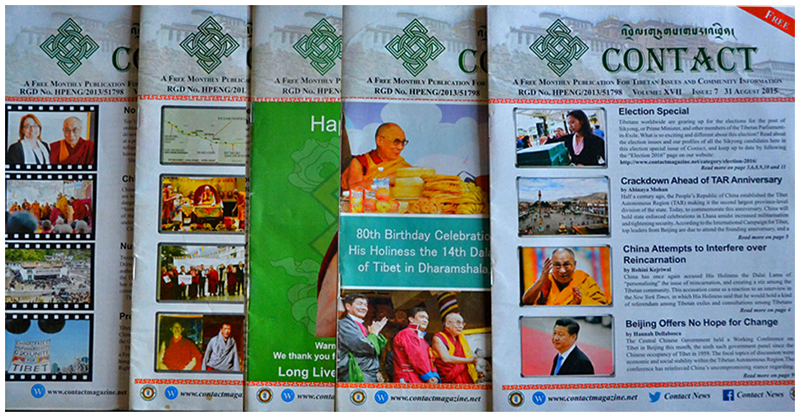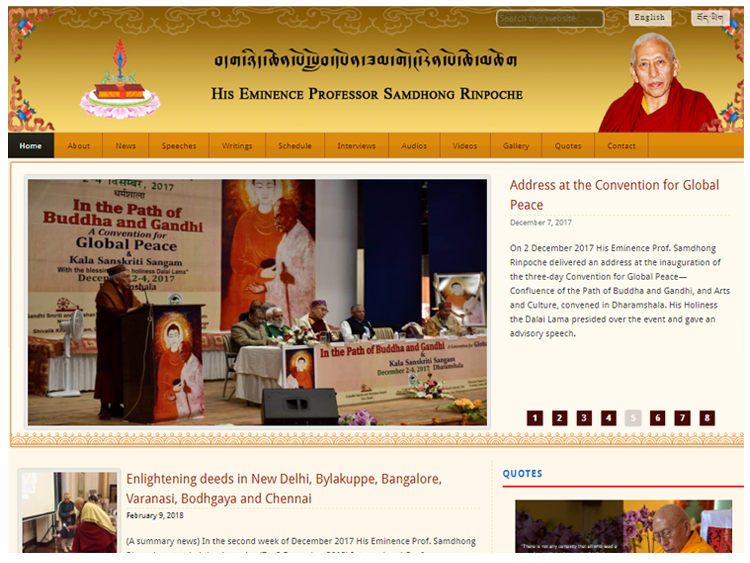Lha’s Projects
Lha’s primary goal is to provide meaningful, multi-leveled social services, to help ease the transition for the Tibetan refugee community. Lha’s services are open to Tibetan refugees, as well as the local Indian population, and people from the Himalayan regions.
The donations from volunteers and exchange groups staying in Lha’s accommodations have allowed Lha to become more self-sufficient and sustainable. Our Language classes, Computer classes, and other daily social services are now able to continue to be provided regardless of outside funding. However, to keep up with the growing needs of the community, and to maintain the operation of our other social services and special projects such as the soup kitchen, Contact magazine, clean water, environmental initiatives, HIV/AIDs awareness, eye, dental and health care, we continue to rely on your generous donations.
Since Lha’s founding in 1997, we have continued to be inspired by the compassion, dedication and contributions of generous supporters, and thousands of volunteers from around the globe.
Please follow the links below for more details about our special projects. If you are interested in supporting any of these projects, please feel free to contact us at director@lhasocialwork.org
T o help achieve its organizational objectives Lha is seeking funds to complete its clean water project which focusses on the provision of clean drinking water at identified areas of need in Dharamsala.
o help achieve its organizational objectives Lha is seeking funds to complete its clean water project which focusses on the provision of clean drinking water at identified areas of need in Dharamsala.
Whilst Dharamsala receivers the second highest rainfall in India, the community suffers from the effects of both polluted drinking water and water shortages. This is due to inadequate water storage facilities and outdated drainage and septic systems which are simply overwhelmed by heavy monsoon rains.
The large numbers of refugees living in poverty means that they are forced to rely on India’s inadequate public water system. According to a 2009 survey, 94% of Tibetan refugees drink tap water because few can afford to regularly buy filtered water…Readmore….
 Lha currently seeks funds to ensure continued success of its grassroots ‘contact magazine’.
Lha currently seeks funds to ensure continued success of its grassroots ‘contact magazine’.
To further support its organizational objectives Lha Charitable Trust also offers Tibetans in exile a free press – Contact Magazine.
Contact, a grassroots monthly magazine in publication for over 14 years, is an important source of international and local news, information on Tibetan issues, upcoming events in Dharamsala, local resources and volunteer opportunities.
Contact is a registered and recognized by the Office of the Registrar of Newspapers for India, Ministry of Information and Broadcast, Government of India. The registration number of Contact is HPENG/2013/51798…Readmore…
 Summary of Lha’s Health and Hygiene Services– Eye Testing Project
Summary of Lha’s Health and Hygiene Services– Eye Testing Project
In September 2009, Lha took a small budget surplus and decided to implement a free eye testing program to all residents in Mcleod Ganj, both Tibetan refugees and the local Indian population. This decision was sparked by feedback from the refugee community, many of whom had complained of eye sight problems.
Through working in conjunction with a local eye doctor, who performed preliminary testing at Lha’s office, a doctor at Delek Hospital, who performed more detailed testing, and an optometrist, who prepared prescriptions for those who required glasses, Lha was able to provide prescription glasses to a total of 145 people in need. Such was the demand for this new service, Lha’s budget ran out within a month. Those that had their eyes tested and received glasses were very happy with the outcome. Many wonderful comments were received about how much people’s lives had improved by having their poor vision corrected…Readmore…
 To support Lha’s objective of preserving the Tibetan culture and environment, funds are currently needed for the smooth running, development and management of our Tibet Nature website (in Tibetan and English version). The Tibet Nature website provides deep knowledge on current environmental issues which includes translation, update, research and production of related documents to create awareness across the globe.
To support Lha’s objective of preserving the Tibetan culture and environment, funds are currently needed for the smooth running, development and management of our Tibet Nature website (in Tibetan and English version). The Tibet Nature website provides deep knowledge on current environmental issues which includes translation, update, research and production of related documents to create awareness across the globe.
Destruction of the Tibetan environment has global implications. The Tibetan plateau is the world’s third pole, with its vast ice fields giving rise to waterways that influence the lives of about 85% of Asia’s population, or 47% of the world population downstream. The Tibetan Plateau is the principal watershed of Asia and as many as 10 major rivers originate here.
This fragile ecology is now under threat due to excessive exploitation of natural resources (particularly logging of the virgin forests, extensive mining, damming of rivers, dumping of nuclear waste and population increases due to Chinese policy of resettling Chinese people in Tibet)…Readmore…
 Tibetans in exile are categorised as a high risk group for HIV infection due to high mobility, lack of awareness of the disease. According to the Central Tibetan Administration’s (CTA) Demographic survey of Tibetans in Exile 2009, almost 15% of the total working population engages in the sweater selling activities (seasonal street vendors)—most of whom travel to urban areas alone and are separated from their families for several months out of the year.
Tibetans in exile are categorised as a high risk group for HIV infection due to high mobility, lack of awareness of the disease. According to the Central Tibetan Administration’s (CTA) Demographic survey of Tibetans in Exile 2009, almost 15% of the total working population engages in the sweater selling activities (seasonal street vendors)—most of whom travel to urban areas alone and are separated from their families for several months out of the year.
Although no formal study has been conducted to determine the risk factors amongst Tibetan male refugees, it is highly speculated that they are at risk of exposure to HIV due to engaging in unprotected sex with commercial sex workers. HIV prevalence amongst commercial sex workers in India is significantly high according to the World Health Organization. Data on the HIV/AIDS situation in Tibetan communities in exile is limited, however according to the CTA Department of Health data of 2010, 130 cases have been reported in individuals in exile. In Tibet, as of 2009, 103 cases were suspected…Readmore…
 Lha is currently seeking funds to support the full operation of its Community Soup Kitchen initiative for the duration of one year and to support the development and implementation of a self-sustainability plan for the project.
Lha is currently seeking funds to support the full operation of its Community Soup Kitchen initiative for the duration of one year and to support the development and implementation of a self-sustainability plan for the project.
High numbers of refugees living in poverty result in a large scale inability to buy nutritiously dense food. This contributes to increased incidences of chronic lifestyle diseases, such as type 2 diabetes, gastritis, liver cirrhosis, heart disease, and hypertension.
According to a 2009 Census, 44% of Tibetans living in Dharamsala and surrounding settlements suffer from one of these chronic lifestyle diseases.
The Lha Community Soup Kitchen aims to alleviate cases of malnutrition in Dharamsala by offering nutritious, low-cost or free meals to 40-50 Tibetan refugees daily. So far 451 needy people have benefited from the Soup kitchen project in the last eight years since its inception…Readmore…
 The 21st Century is considered to be the era of internet. The Tibetans both inside and outside of Tibet have shown great interest and fondness for the internet as other people of the world. Hence, through this website, Lha Charitable Trust, an institute for social work and education, has decided to promote and broadcast the extensive and valuable teachings and writings of Professor Samdhong Rinpoche under the umbrella project of Preservation and Promotion of Tibetan Culture and Tradition.
The 21st Century is considered to be the era of internet. The Tibetans both inside and outside of Tibet have shown great interest and fondness for the internet as other people of the world. Hence, through this website, Lha Charitable Trust, an institute for social work and education, has decided to promote and broadcast the extensive and valuable teachings and writings of Professor Samdhong Rinpoche under the umbrella project of Preservation and Promotion of Tibetan Culture and Tradition.
Rinpoche’s speeches and writings on Buddhism, non-violence, education, political science, democracy, law, history, auxiliary sciences, language, environment, promotion of virtue, promotion of peace, values of life etc are available in media formats whereby we can read, listen to, and watch them in English, Tibetan, and Hindi – but there has never been a compilation of all these together. We are therefore delighted to present all of Rinpoche’s speeches and writings in here for the benefit of all people throughout the world and particularly to the Tibetans living in Tibet and outside of Tibet who wanted to learn and give respect and importance to the Rinpoche’s works…Readmore…
Read {hits}391{/hits} times
